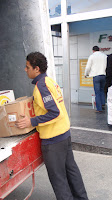
We first met Fakir and his family in late summer 2008 when we provided Fakir with a micro-project of tools he needed to make his intricate and graceful art plaques.
One day, when doing a follow-up visit, his two daughters showed us a letter they had written to UNHCR that brought tears to our eyes and compelled us to take a special interest in helping this family overcome some of their many obstacles. His daughters' letter began, "All over the world, children love their childhoods; they are supposed to love them" and continued, "but we hate ours." The two girls then wrote of the many challenges they faced and made a plea for help.
All four children were traumatized during the initial invasion in 2003 and suffer involuntary incontinence as a result. Their parents had taken them to a doctor in Amman and was told that they were "misbehaving"! With the frustration of dealing with a home that smelled of urine, inadequate laundry (and even water to do laundry with), as well as his own depression, Fakir had been punishing the kids after hearing this "diagnosis". Our first step was to let him know that this was not intentional behavior and then to find solutions. Some CRP supporters sent funds for thin, easier to launder blankets, waterproof bed pads, and sheets. Some in the medical community offered advice which we passed along. We encouraged the parents to show loving understanding with their children in order to lessen the stress that only increased their incontinence.
We brought special gifts for these kids who have endured so much - new tops and a toy each
At that time, all of the children had left school. Other students teased and bullied them and the older boy was afraid to even go onto the streets because bullies had assaulted him. Even their teachers had ridiculed them about their incontinence - one of their teachers actually held her nose in disgust when the child walked by and the other students in her class followed her example.
Fakir's kids were vulnerable to this sort of abuse for other reasons, too. Iraqi children are taunted and bullied just because they are Iraqi. Jordan is primarily Sunna and Fakir's family is Shia. Being from the southern part of Iraq, they are also very dark skinned. This type of abuse occurs most often in some of the poorer areas of Amman. Finally, in frustration and with the intention of protecting his children, Fakir had pulled the kids out of school.
We knew that an education was important if these kids were to be able to overcome the many obstacles they face. They wanted to attend school. We worked with them on strategies to counter bullying and helped with new shoes, book bags and school supplies. They enrolled in diferent schools than they attended before and have remained in school.
On our recent visit, they told us that the daytime incontinence has improved greatly - the kids are no longer wetting themselves although they must still leave the classroom to use the restroom frequently. Their teachers know that they must be allowed to use the restroom more frequently than the other students. But recently both of the older children had been refused when they asked to be excused. One child obeyed and wet herself. The other left the classroom to avoid wetting himself and was punished for disobeying. One of the children is so upset that she wants to leave school again.
I will make appointments to visit both schools, letting the staff know that I am an interested friend of the children who is invested in their education and ask that we discuss together how we can all best facilitate the children's success in school. I hope that this has some effect. These are bright kids with a tough road ahead of them if they do not continue their educations.
 The damage of war extends far beyond the battlefields. Many of its youngest victims carry their wounds inside them. These wounds do not heal as readily as those to the body. We must do everything we can to heal these deep wounds but it is challenging when these children are wounded again and again after leaving the war zone.
The damage of war extends far beyond the battlefields. Many of its youngest victims carry their wounds inside them. These wounds do not heal as readily as those to the body. We must do everything we can to heal these deep wounds but it is challenging when these children are wounded again and again after leaving the war zone.






























